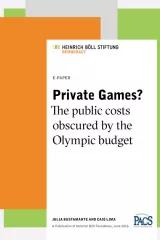Private Games?
The 2016 Olympic Games close a decade of mega-events in the city of Rio de Janeiro. After the 2007 Pan American Games, the FIFA Confederations Cup and the World Cup[1], it was promised that 2016 would be the time to celebrate sport, the union of nations and to crown a transformed city.
The beauty of the city, the love for sports, the joy and the receptivity of the Brazilian people are elements that populate the international imagination of the games in Rio. However, the reality is often harder than the television and marketing images want us to believe. The transformation of the games in business and how the government directs resources has been transforming Rio de Janeiro into a place of constant human rights violations, and deepening an unequal and exclusive city project. By frustrating the hopes of a city that would be transformed for the benefit of all, however, the Olympic project was spoiled for millions of natives.
The city project in course and the serious human rights violations have, even with little space, been reported and analyzed. This article is part of this effort and it aims to present in the clearest possible way how the budget of the Olympic Games unlock the data and the official discourse and to explain some of the main beneficiaries of their implementation and the stakes of these actors. However, exploring the details of the game budget requires an Olympic effort, and as the preparation of the Olympics has already been called the “Obscure Games”[3], it can be said that Brazilian rulers are in a marathon of a merely acceptable level of transparency and participation.
In the Olympic Games Opening Ceremony the leading authorities being targeted by the cameras will be Dilma Rousseff and Thomas Bach, respectively presidents of Brazil, the host country, and of the International Olympic Committee (IOC). In addition to these two there will be Eduardo Paes, Mayor of Rio de Janeiro. As Mayor of the host city Paes is the largest supporter of the mega event. In this position the Mayor and his administration have repeatedly disseminated information that most of the Olympic funds come from the private sector. This is a fallacy.
Against this discourse we try to contribute to the public debate on the financing of the Games even more important in this tax adjustment context implemented in three instances, which has deepened the budget cuts in social areas. The official data on the Olympic budget will be presented in the first section. Then we try to present arguments that question the official data, and highlight that there are public resources omitted from public funds or disguised as if they came from the private sector. Next, we will present the greatest beneficiaries of the execution of mega-events and of the implementation of the city in the project in course.
Authors: Julia Bustamante and Caio Lima, Instituto Políticas Alternativas para o Cone Sul (PACS) Translation: Fal Azevedo Editing: Primacy Idiomas
Just weeks before the Olympics, the state of Rio de Janeiro has declared a "state of calamity" over finances. Money is missing for education and health, as well as to pay salaries and pensions of civil servants. The federal government has to help out so last construction sites for public transport can be finished and to guarantee public security during the Games.
The empty public budget has many causes. Even if Rios Mayor Eduardo Paes, a big supporter of the Olympic Games, repeatedly insists that the funding for the Games is predominantly private, he cannot ignore the fact that the Games contributed to the state's bankruptcy.
Julia Bustamante and Caio Lima from the Instituto Políticas Alternativas para o Cone Sul (PACS) analyse the Olympic budget and show that the public money spend for the Olympics is higher that officially communicated: Considering the waivers and unaccounted tax exemptions, public expenditure and transfers of government to public-private partnerships, the Brazilian state is the true promoter of the Olympic Games.
Product details
Table of contents
Content
- How much will the Olympic Games cost?
- Initial Budget
- What does the official discourse hide?
- Who is winning gold?
- Conclusion
- Imprint
